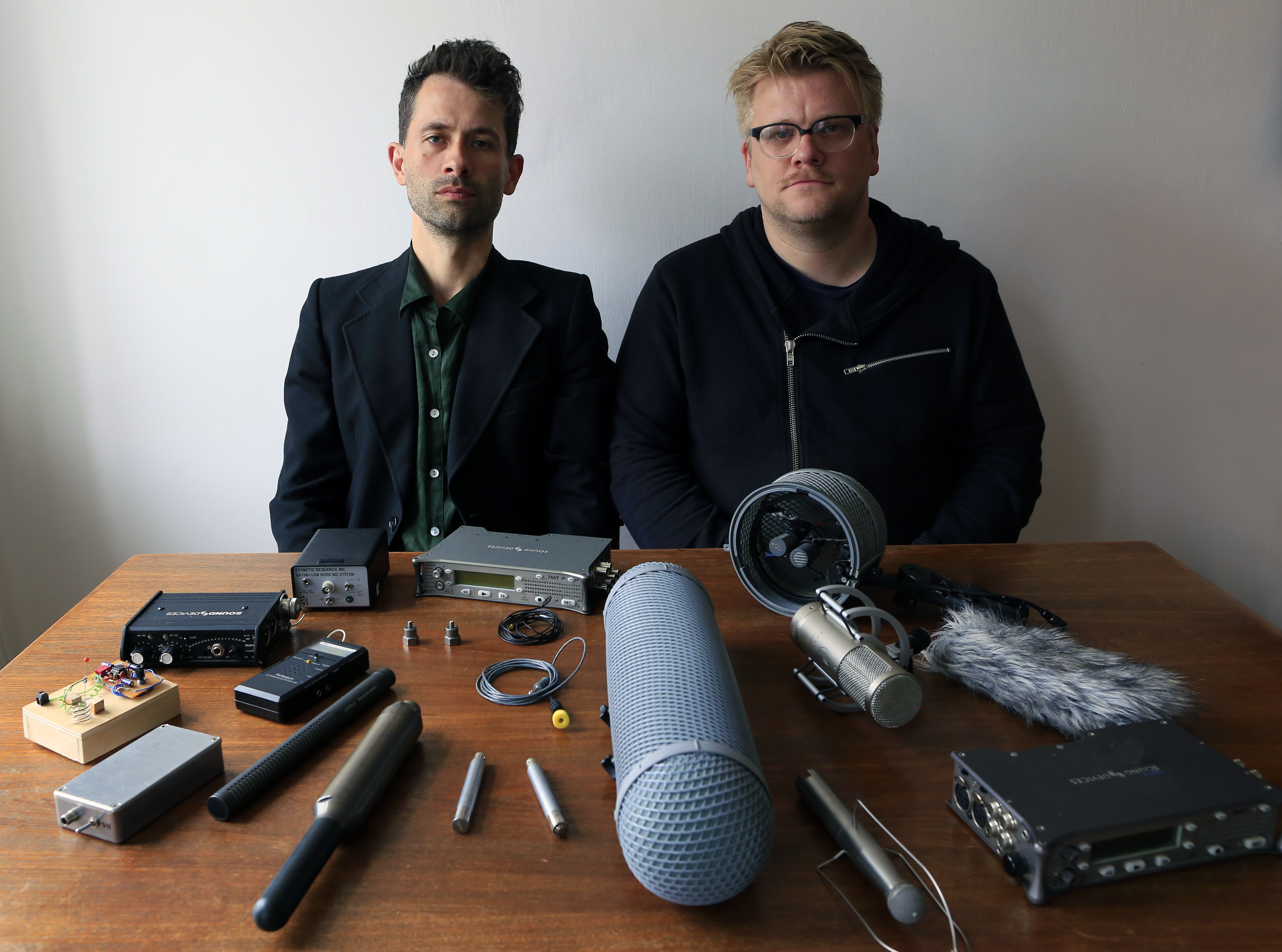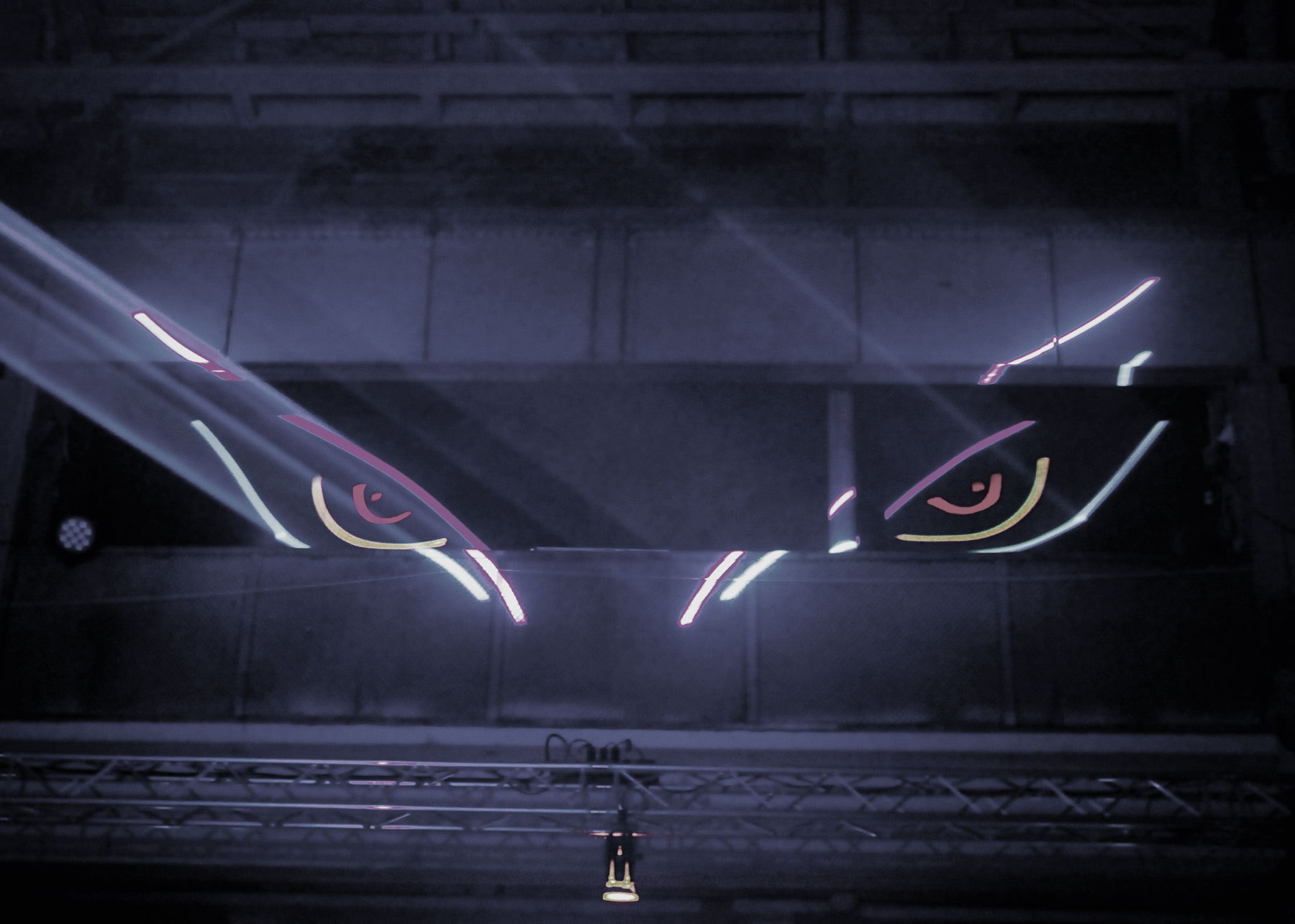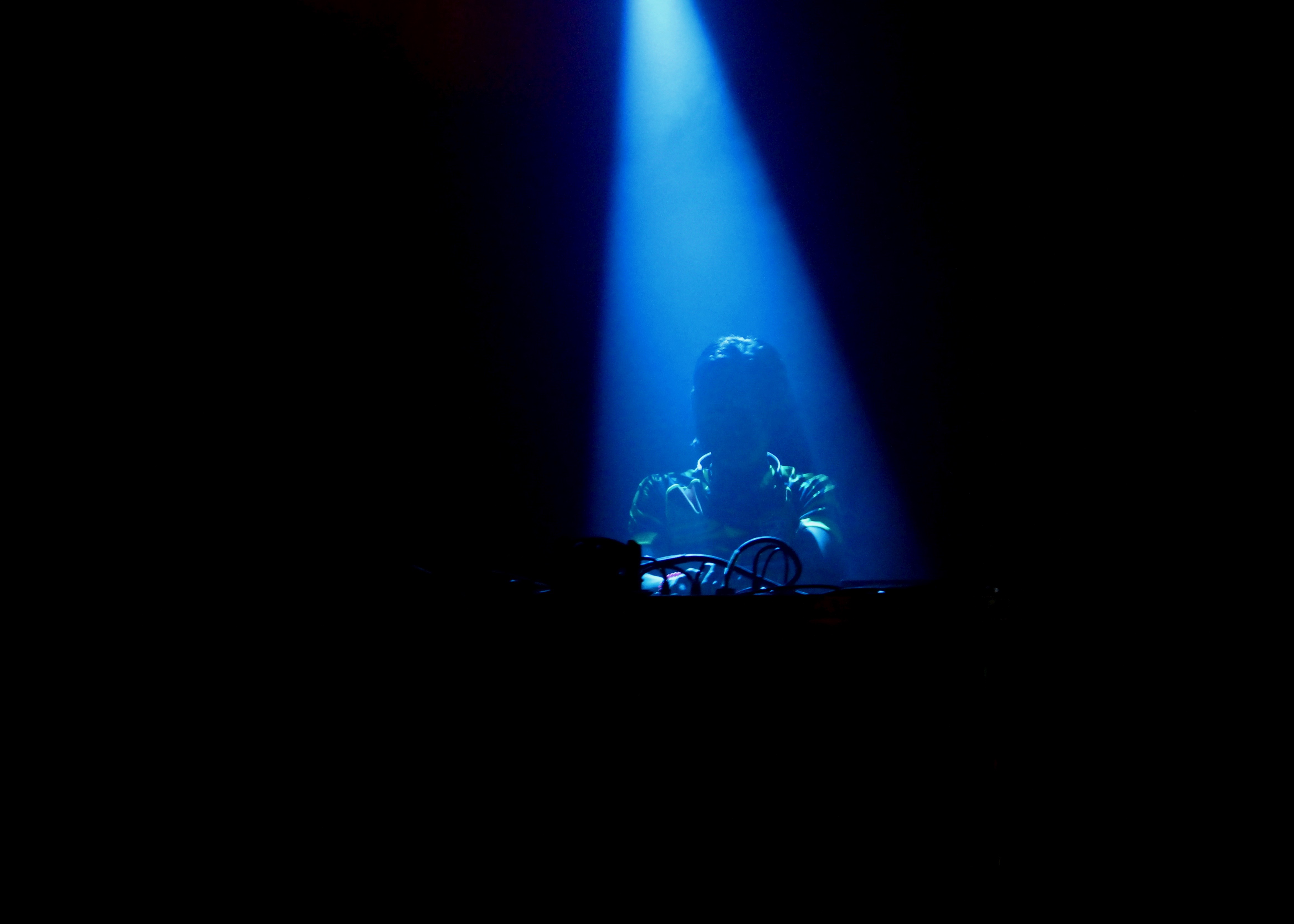Thoughts on Fitting In – a conversation with Rabit and Why Be
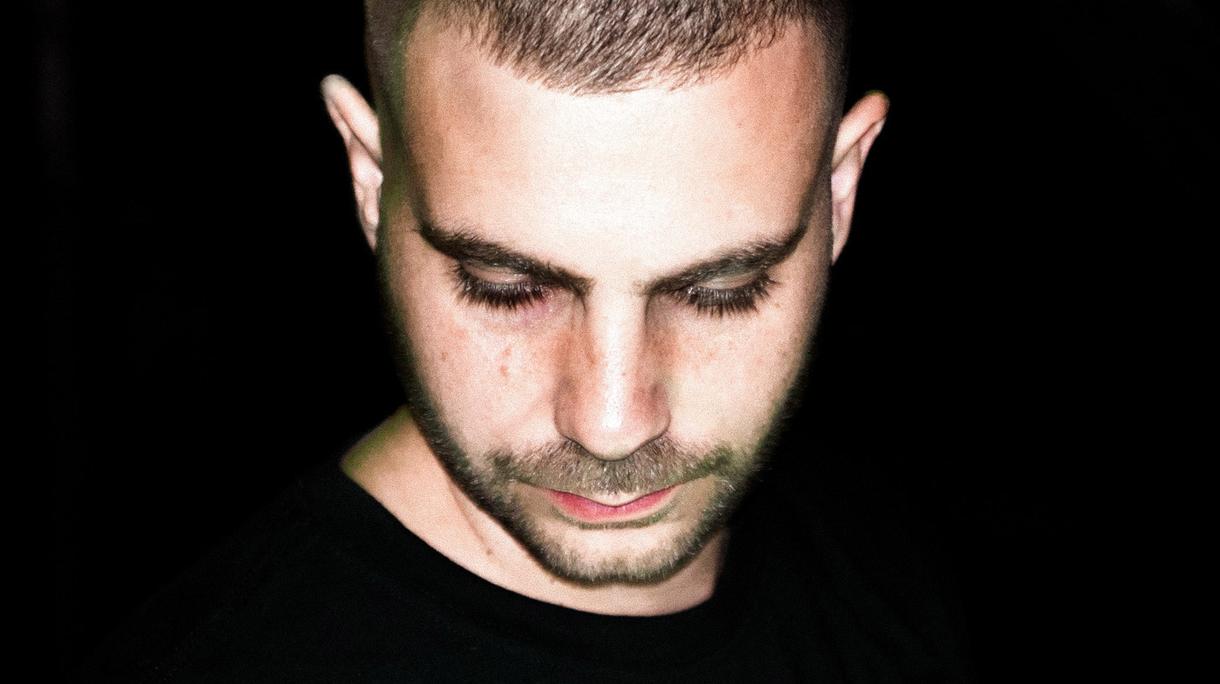
Written by Nicolai Vesterkær Krog
Though having a genre-defying approach to his artistry, Rabit – the moniker of Houston, Texas based Eric Burton – has often been mentioned in association with the (otherwise London-centric) grime genre, especially in its more “weightless” forms. Meanwhile, that simplification has long proven insufficient. Culminating with the debut album “Communion” and the preceding EP “Baptizm” (both released by Tri Angle), Burton showcased new sides of Rabit, weaving environmental noises and sound effects into his grime-approved sound palette. With a much more brutal dynamism than on previous outings (and contrasted with more delicate phases), both records cinematically merge grime, industrial, noise, jungle and ambient into a distinct sound. Both releases address his catholic upbringing and express to have found new strength in what he had previously been taught to consider weaknesses, displaying a more politicized (though never directly political) thematic occupation. Burton’s album also largely stepped away from club functionality, being a record that requires countless listens and the listener’s undivided attention to fully unfold.
All falling out of the “straight white male” category, Rabit is sound-wise often boxed-in with artists like Arca, Lotic, ANGEL-HO, and Elysia Crampton. Their common ground equally refers to the theme of body politics, partially because their music doubtlessly share links with club genres while in most cases sounding as if the body would have to be bent into strange shapes to be able to move to it. Though “Communion” and “Baptizm” were only released in 2015, Rabit’s sound has since taken even more adventurous turns, such as via collaborations with peers like NON Worldwide’s Chino Amobi or the recent “R&D” EP with Dedekind Cut (formerly known as Lee Bannon). Over the course of 4 tracks, “R&D” presents a 12 minute collage of dark ambient, noise, techno, jungle and breakcore.
Korean-born, Denmark-raised and Berlin-based, Tobias Lee aka Why Be has long been associated with Copenhagen’s Syg Nok crew and label. After years of focusing on keeping his expression as free as possible (and therefore sidestepping official releases), 2015 saw the release of Why Be’s “Snipestreet EP” on Rabit’s then newly-founded Halcyon Veil imprint. While sharing moods with Rabit and expressing an equally anarchistic approach to “traditions”, “Snipestreet” is also testament to Why Be having a sound that is uniquely his own. Lee blends techno, grime, ballroom-sounds, tribal-feels, dystopian ambiences, and gimmicky (though in no way kitschy) sound effects on the EP that is incredible in its juxtapositions and almost unimaginably varied without it ever feeling forced.
A few hours ahead of Why Be and Rabit’s performances at the 2016 edition of Berlin’s CTM Festival, the following conversation took place in Burton’s hotel room across the street from the night’s venue, YAAM. Due to a chance encounter a couple of days earlier between Lee and yours truly, Why Be was drawn into the conversation which nonetheless revolved around Rabit to the point of a horizontally positioned Why Be dosing slightly off midways.
Interestingly, though the abstract sounds of Rabit generally pose more questions than they answer, his responses are typically down to earth rather than philosophically or politically speculative. Fittingly, Burton – simultaneously contemplative and nonchalant – spent the duration of the conversation rolling a single joint. Reluctant to define musically inherent themes, the interview mainly revolves around topics surrounding Rabit’s music rather than pinning subjects to the actual sounds. Considering the boundary-pushing music of both artists, CTM Festival’s theme, “New Geographies”, was the natural outset:
P/A: On one hand, the theme is about the decreasing importance of physical distances on culture due to the internet… So to say: The complex relationships between local and global cultures, resulting in “increased cultural hybridity and the multiplication of perspectives.” [Quoted from the festival’s own description of the theme.] Which means, on the other hand, that the theme also points to a focus on non-Western artists and queer artists. In relation to that, I was wondering about Halcyon Veil and how it’s been described as focused on “non-white” artists. Tobias, maybe you have something to say to that? Also, how did you two come in touch?
Tobias: “The internet gets real fun when you see stuff materialize or you meet people in real life. That’s the reward, that’s the reason. Without the internet I wouldn’t be doing what I’m doing, but if nothing had an IRL output or effect I probably wouldn’t be doing this anymore.
Eric just hit me up and I was spiralling hard living on my friends’ floor. He gave me an offer to do something new and it was just the right time for me. I see how it’s easy to group artists based on race or sexuality but it’s deeper than that, I feel. None of us live the same life anyways and I have personally never had the need to “understand” my friends. Everything is founded on fascination and respect and a desire to create something.”
Eric: “We just came in touch because we know a lot of the same people, and I was familiar with his music, but more bootlegs and his mixes and I wanted to hear the original stuff. That’s basically how it came about, right?”
T: “Yeah, it was as you were just saying… Sometimes you have so many mutual friends that it’s inevitable that you end up meeting. I mean, I don’t believe in fate, but I’m just saying: the chance of me meeting Eric made sense through the people we hang out with. It was actually late before I found out about Eric to be honest, it was like 2012 and that was only via this bootleg “Dirty Laundry” [edit of Kelly Rowland]. It was just such a good edit.”
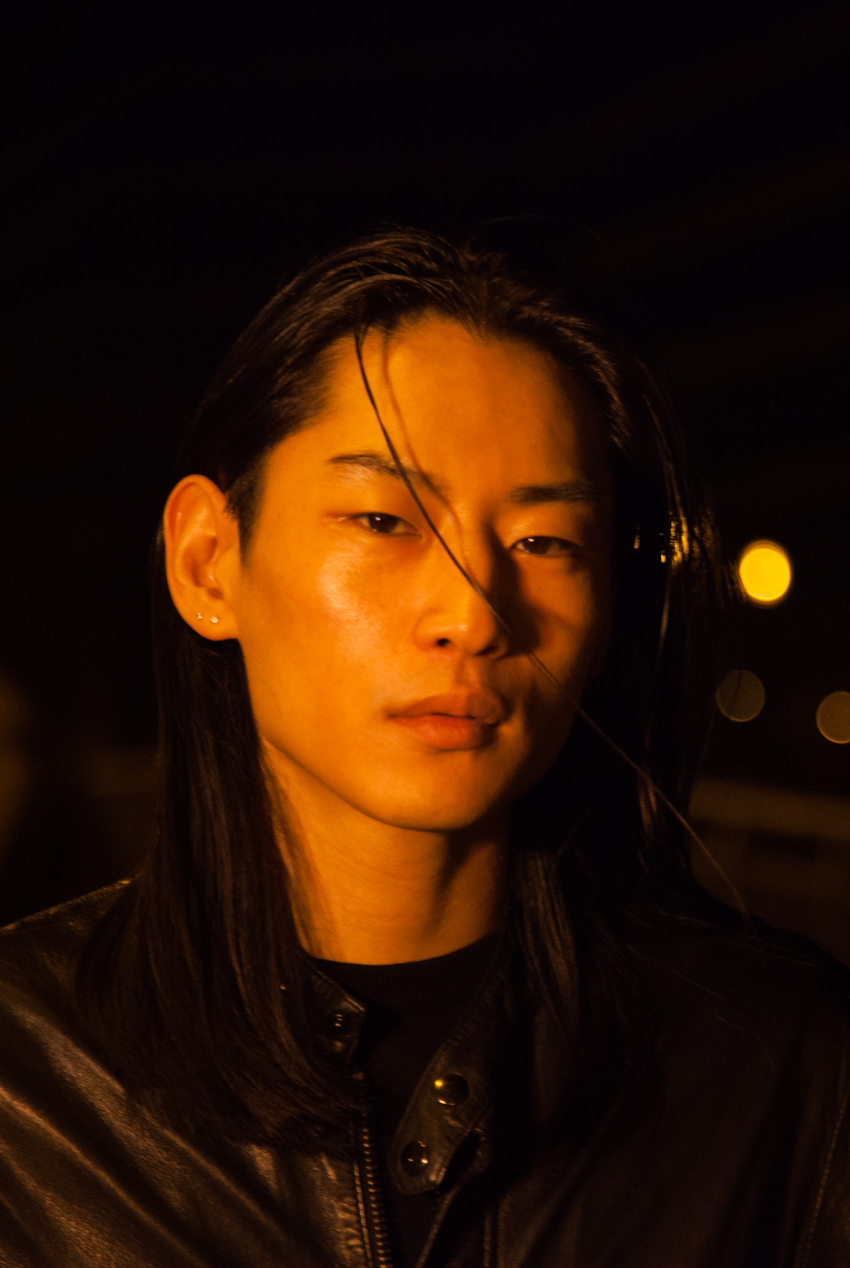
P/A: So when did you meet?
E: “It just happened on the internet, I don’t know what year it was. I was interested in the work that he creates or would create, and that’s why I initially asked him for stuff, because… A lot of my reasoning for doing the label, it varies… I might hear something specific and be like “This track’s really cool, I wanna help put it out”, but it can also be just the case of seeing someone who’s an interesting artist in their own right, and then kind of urging people to put something together. Or helping them, because… Each artist needs different things in order to make something happen. Some people just might need one thing, some might… need a lot? I could kind of tell that he had something interesting going on and really just needed someone to put it out, or to offer the opportunity to, you know… “if you wanna do it then I wanna do it too”. And it [starting the label] was also a part of seeing a lot of talk about a lot of the new sounds that are becoming popular in Europe. I wanted to see actual releases by people that I think deserve to be heard more. Because there’s a lot of articles written on the internet about all of these different kinds of people throwing parties in Europe, and the different scenes and sounds, but not a lot of people put out releases. They might put out a lot of free music or music online, but I feel like because the dance music world is so regimented, there’s a lot of scenes where it’s like, if it’s not on a record it’s not real, it’s not a legitimate release. I don’t really co-sign to that or anything but… I want to play with it too at the same time. Putting stuff on a record that people might not expect. Like, no-one might not buy it but it’s almost like a statement, you know what I’m saying?”
T: “That’s what reverbs a lot, the statement. Because you don’t actually have to put out a record.”
E: “Yeah, exactly. Also, in relating to that “New Geographies” theme that you were saying… Festivals are really cool and everything. People can write a lot like “oh, I wanna support this type of artist, or this type of artist”, but the actual work that needs to be done is something that a lot more people could be doing. Which is releasing music and… helping people. I think that festivals seem to be doing a little bit more, they’re supporting new sounds. So I guess that’s the reason why I did the label [because] I didn’t really see the labels doing that. You’ve got festivals supporting new people but a lot of the labels that are established haven’t really taken on a lot of the new sounds.”
P/A: So it’s a way of helping to establish new artists?
E: “Yeah, pretty much, yeah.”
P/A: Tobias, you’ve been producing for some years, but “Snipestreet” is your first official release. Having been avoiding the constraints of official releases, “Snipestreeet” is somewhat of “a new territory” for you?
T: “Definitely. I guess I stopped waiting for the right time because it simply doesn’t exist. The combo of being restless and a slacker takes you funny places.”
P/A: Eric, you’ve been doing a lot of collaborations with other artists, especially recently. How important are these collaborations for you and how much do they feed into your own work?
E: “I think everything kind of works off of itself in a way. I might do something on my own that I might not create with another person. That’s what I like about collaborating, when you really do put multiple ideas together and then come up with a new result. In those instances where I do other projects that’s basically all it is, it’s just a chance to play with new ideas.”
P/A: How much do you consider your music’s message to the audience, whether in the process of making it or afterwards?
E: “I really don’t [consider the message]. I mean, some stuff is what a label does in order to get people to listen to the things… You know, that’s why we have press releases. But for me, I don’t really directly try and do that, for me it’s a lot more subtle. I have my own beliefs, do you see what I’m saying? There are things that are important to me, but I would never make a track and be like: “I’m gonna make people change their minds about this with this track.” And I’m not knocking anyone who would do that, but that’s not the space that I’m in. I just create things that I like that sound cool. And so, any information that people want to get off that, I think it’s on a much more subtle level. That’s why I enjoyed making an album because it was a chance to combine a bunch of smaller parts into a larger thing, and it just kind of having its own statement in and of itself aside from what anyone thinks it’s about. Just being able to communicate in that way, that’s what I enjoyed mainly.”
P/A: I’m asking because your releases seem to gradually have gotten more extreme.
E: “Right.”
P/A: Does that have anything to do with how your music has been received?
E: “You mean, [if] it was created as a response?”
P/A: Not necessarily, I just mean… I’ve read that your Tri Angle releases, “Baptizm” and “Communion”, were specifically about finding your personal strengths in what you had previously seen as your weaknesses. And it seems to me that your productions have taken an even more extreme turn after the album. Is pushing the boundaries further connected to how your Tri Angle releases have been received?
E: “Oh yeah. Yeah, it’s given me confidence to kind of do more what I want to do, I guess. And as far as I turned towards a certain direction over time…. I don’t know, I think it might be just because of what I listen to on my free time. My music is affected by whatever I’m into at the time.”
P/A: So what have you been into?
E: “Just getting into more noise or just listening to bands I used to listen [to] and then kind of forgot about. Stuff like that. Not so much electronic music. Or if it is, then not in like a dance formula or something. So naturally my music is in that direction.”
P/A: Something I’ve been wondering about is, there’s a lot of dragon references in your earlier stuff. What’s up with that?
E: “That’s a good question. I’m not really sure. I don’t know, I think they’re just cool. [Laughs.] And that’s the most basic thing. “Black Dragons”… I was just doing research on different things at the time, and that’s a gang. It might still be a gang, I’m not sure. I always thought dragons were cool, and I think it specifically came about on one song because I was trying to visualize shapes. And so, I was visualizing a dragon, a dragon back, and how wings are something coming out of it, and I thought the track that I made felt similarly shaped or something. That’s what gave me that idea. So I just kind of kept using the word.”
P/A: But the gang reference…
E: “It’s basically just leaving a clue or something. Some tracks might have a title that has no meaning and it’s face value, so whatever you immediately read it being, is what it is. And then other times I might leave something [to] have a double meaning, or hidden meaning. That’s all that was.”
P/A: A lot of the interviews you’ve done previously have been about grime…
E: “Truuuuue.” [Looks at Tobias and both laugh.]
P/A: …and that it’s not something you’re particularly happy to speak about, right?
E: “No, it’s fine. I don’t have a problem with it. There’s not much more to say.”
P/A: I’m still a little bit interested in it. How did [grime MC] Riko Dan end up doing a version of “Black Dragons”?
E: “Glacial Sound wanted to get a special vocal version of the track made, but just as an exclusive for him [the owner of the Glacial Sound label] to play. People that are familiar with dubplate culture would know about it… He basically just asked Riko to do a vocal version of the track, and it was originally made for him to play in his sets, this is the guy from Glacial Sound, Paul [Purcell]. He just played it a bunch of times and everyone wanted to know what it was, so we just worked out a way to put it out as an official track. That’s how it came about. So it’s kind of funny, because that’s actually the only grime track I’ve done that had a vocal, and it wasn’t even made with the intention to be a release, it was just made for a dubplate or whatever. So that’s kind of funny, because if that never happened then I might not ever have had to answer any questions about grime or anything, so it’s kind of ironic actually, isn’t it? [Laughs.] It’s kinda funny.”
P/A: You seem to be really accepted within the grime scene, which is not really a scene that’s normally associated with open-mindedness towards sexuality and gender. How do you emphasize that acceptance? If at all…
E: “I think that only just came about because maybe people in that scene knew my music but didn’t know a thing about me. When [producer and DJ] Slackk had that year when he did a mix every month or something… Around that time, it was something I did for fun. I was like “Ok, what if I just try to make something every month and send it to him again on every single one?” So I was just sending a lot of stuff to the DJs there [in the UK], so they were familiar with my music before they knew anything about me. Basically that’s how that came about, they were just playing my music, it wasn’t like any kind of political statement or anything.”
P/A: What about now? I mean, there’s still support coming from there….
E: “Yeah, definitely. I think you can change the kind of music you make and the people that are your friends and that you’re cool with are still gonna… you’re still going to support each other. Even if you don’t play their music, you still have a relationship with people, still support what they do.”
P/A: To me it kind of looks like a new openness…
E: “Maybe. But I mean, I think that also coincides with the scene going away from [its] original tracks, and so it’s a different scene of Boxed [London club night hosted by Mr. Mitch, Oil Gang, Logos and Slackk] or whatever else compared to what grime used to be. But then I think [that] the guys that do Boxed don’t even really consider themselves grime. They probably wouldn’t even really know or care what anyone called it. But I definitely think those two scenes have kind of gone on divergent ways. For sure.”
P/A: In this whole connection with grime, but also in general, you are often spoken of as an outsider. How do you relate to that? Do you consider yourself as being outside of anything?
E: “I guess the most basic way that came about is because I’m on the internet, and all those people are in one location. You know, you’re contributing to a scene that’s your base in one place, and [when] you’re on the internet [geographically removed from the scene] you’re definitely outside of it. It’s all just weird, because I didn’t also ever make my music to be one kind of way or be a part of this genre. For me it was almost like fucking with people, like “oh, I wonder what I can make and if they’ll still play it, the grime DJs”. That’s pretty outsider-ish, I guess.”
P/A: So it’s more of a geographical thing?
E: “I guess. I’m not sure… I mean, it’s a sound thing as well, you know?”
P/A: That’s part of what I’m thinking about. Do you consider yourself in relation to any sound or is it more just a question of narrative?
E: “Well, I mean it’s kind of funny you said that, because when I first came out, I got more attention – or whatever you want to call it – in the UK and in Europe than in America, but as time has gone on I think my music has gotten more American sounding. A lot more actually. So I don’t really know if that’s just a matter of, I don’t know, finding [out] what I want to do or something. But yeah, I do think my music sounds… Sounds kind of American to me. I don’t know if it does to other people. I don’t know, what do you think?”
P/A: I think now that you say it, maybe there’s a point there. It has become noisier…
E: “Yeah, yeah. I mean, I guess that comes with age as well. I feel like, being a certain age it’s like there’s only a certain music it’s appropriate or “cool” to listen to, and as I’ve gotten older I can just listen to or DJ whatever I want to. And as I’ve, you know, grown in music that’s kind of fed into what I create as well. [Pause.] I just care less. [Laughs.] I just care less and less each time basically.”
P/A: That makes me wonder again about the question from before… Has it given you more confidence that your music has been accepted?
E: “Yeah, it has, but it’s never enough for me because I still don’t feel like a part of anything. When I walk outside, I don’t feel like I belong with other people. Like, I just don’t. It doesn’t matter what country I’m in. In America I feel a little bit more at home, you know? But now being in Europe or something, I totally feel out of my element. And even just being in public in general anywhere I usually do. And so that’s something I also just… it took time to realize as well. I don’t intentionally try and have my music convey that. I think it just comes across maybe… by itself. I think a little bit I try to expose some of those feelings. But it’s really hard to put into words. It’s not something that I write down [like;] “ok, this is about this or this”. So yeah, the outsiderness, I guess that could translate. It doesn’t necessarily have to be [connected to] genres, it’s really kind of general.”
P/A: Feeling as an outsider anywhere, how do you relate to that? Do you feel the need to fit in anywhere?
E: “Oh, yeah. I think we all do, and that’s the weird thing about society, that when we step outside we all feel the need to fit in. That’s basically why most people do everything they do, you know? So I guess over time, that’s why my stuff has gotten weirder and weirder. And a little bit darker, because the older I get, the more I see those things. Just about society in general. It’s complicated. [Laughs.]”
P/A: Tobias, based on an interview of yours, I read about being spoken of as Chinese on more than one occasion, maybe you’d like to jump in here as well?
T: “I gave up “trying to fit in” many years ago. At this point, it’s all about staying happy doing whatever I’m doing. I like to think that we have created our own little group of people from all over that share this idea of what the world is and that’s all that matters to me.”
P/A: Eric, how did you end up living in Houston?
Eric: “Actually, I lived in a smaller town in Texas before I moved to Houston, I lived there for a good couple of years. But I moved down there with one of my ex-boyfriends.”
P/A: Considering your connection with cities like New York, London and Berlin music-wise, why do you choose to remain in Texas?
Eric: “It’s complicated. [Laughs.] I don’t know… It’s just [a] really long answer for that. I don’t necessarily see the need to move, you know? With the internet now, you can kind of almost have any job except something that’s performance based. So I’ll see what happens. I might just do more stuff in the studio. And that way I can just stay where I’m at now.”
P/A: How long have you been living in Berlin, Tobias?
T: “Since March [2015].”
P/A: Was your move a long time coming or was it a sudden spur-of-the-moment thing?
T: “It was because I could get a place to live here, and I couldn’t find one in Copenhagen.”
P/A: How’s your connection with the Copenhagen scene now?
T: “It’s the same. I’m connected to Syg Nok and what they do, and then I know some other promoters but I don’t really have any professional ties there, so… I mean, I know a lot of people who do well there and I think it’s super cool and I support that…”
P/A: So you’re not travelling back and forth all the time?
T: “Well I am, but that’s because I’m playing. I’ve been playing there more, I guess, since I moved here.”
P/A: More?
T: “Yeah. But that’s typically what it is, when you’re not there…”
P/A: You’re more popular?
T: “Yeah.”
E: [Laughs.] “That’s so true.”
T: “Well, then it’s like exotic.”

